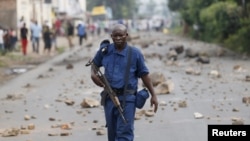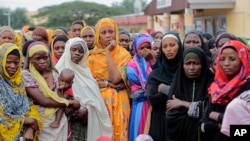Burundi's President Pierre Nkurunziza delayed parliamentary and local elections until June 5, following protests and a coup attempt.
The elections were originally scheduled for May 26. But with Burundi still in a state of political crisis, they have now been postponed until the following week.
Presidential spokesman Willy Nyamitwe said the delay is at least partly a response to both domestic and international pressure.
“Politicians from the opposition have asked the government to delay elections. And the second reason is that head of states from the region, and the U.N., the A.U. and E.U. have urged the government to delay a little elections. And the third reason is that the president got a proposal from the electoral committee,” Nyamitwe said.
He said there has been no decision on whether to delay presidential elections, which are scheduled to be held June 26.
Burundi has been racked by violence and unrest since late April, when Nkurunziza decided to run for a third term.
Thousands of protesters took to the streets, saying the move violates a two-term limit in the constitution. But the president’s supporters say that since he was elected by parliament, not voters during his first term, he should be allowed to run again.
Coup attempt
Nkurunziza survived a coup attempt last week, but the violence has continued.
On Tuesday police fired tear gas and beat protesters, who vowed to keep protesting until the president steps down. Human rights groups said at least 20 people have died in the unrest so far.
While attending a session of the Pan African Parliament in South Africa this week, Kenyan President Uhuru Kenyatta told a local television station that regional leaders want the presidential elections postponed.
“We first and foremost said that it was necessary, given what was going on, that the elections be postponed, but within the constitutionally allowed mandate of the current government, in order to give us time for us to be able to work together with all parties to see how we can get to a situation where we get an amicable solution," Kenyatta said.
Meanwhile, more than 100,000 Burundians have fled to neighboring countries. In Tanzania, the World Health Organization warned of a cholera outbreak among refugees and a lack of clean drinking water.
Leaders from the East African Community are due to meet next week to review the situation in Burundi.





